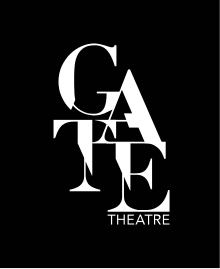Gate Theatre
Amharclann an Gheata[1] | |
 | |
 | |
| Former names | Dublin Gate Theatre |
|---|---|
| Address | 1 Cavendish Row, Dublin, Ireland |
| Coordinates | 53°21′11″N 6°15′44″W / 53.35306°N 6.26222°W |
| Public transit | Connolly station Luas Green Line: O'Connell Street Upper / Parnell |
| Owner | The Gate Theatre Trust[2] |
| Capacity | 371[3] |
| Opened | 1928 |
The Gate Theatre is a theatre on Cavendish Row in Dublin, Ireland. It was founded in 1928.
History
[edit]Beginnings
[edit]The Gate Theatre was founded in 1928 by Hilton Edwards and Micheál MacLiammóir[4] with Daisy Bannard Cogley and Gearóid Ó Lochlainn.[5] During their first season, they presented seven plays, including Ibsen's Peer Gynt, O’Neill's The Hairy Ape and Wilde's Salomé.[6] They offered Dublin audiences an introduction to the world of European and American theatre as well as classics from the modern and Irish repertoire.[4] It was at the Gate that Orson Welles, James Mason, Geraldine Fitzgerald and Michael Gambon began their acting careers.
The company played for two seasons at the Peacock Theatre and then moved to the 18th Century Rotunda Annex - the ‘Upper Concert Hall’, the Gate's present home, with Goethe's Faust opening on 17 February 1930.[6]
Lord and Lady Longford
[edit]The newly established Gate Theatre ran into financial difficulties and a meeting was called on 12 December 1930 to announce its closure. In a surprise announcement, Lord Longford offered to buy up the remaining shares, valued at £1,200 and the theatre was saved. Longford and his wife Lady (Christine) Longford worked with Edwards and MacLiammóir at the Gate until 1936, when a split occurred and two separate companies were formed which played at the Gate for six months each. The companies also toured for six months until the death of Lord Longford in 1961.[7]
During this period Edwards and MacLiammóir (Gate Theatre Productions) performed in Dublin's Gaiety Theatre and toured productions to Europe, Egypt and North America.
1980s–2000s
[edit]From the 1980s onwards the Gate, under the directorship of Michael Colgan, cemented its international relationship, touring plays around the world for audiences from Beijing to New York. The theatre established relationships with contemporary playwrights including Samuel Beckett, Harold Pinter and Brian Friel. In 1991 the first-ever Beckett Festival was produced, presenting all 19 stage plays over three weeks. The first-ever festival of Pinter's plays followed, along with many premieres and productions of Friel's work[6] including the production of Faith Healer with Ralph Fiennes which won a Tony Award on Broadway.[8] Among other firsts was the production of Chekhov's Three Sisters in a new version by Frank McGuinness with three real sisters, the award-winning Sinéad, Sorcha and Niamh Cusack. The production also featured the veteran star of Irish theatre and father of the three actresses, Cyril Cusack and the Oscar-nominated actress Lesley Manville. The production opened in March 1990 and transferred to the Royal Court Theatre in London later that year.[9]
With the support of funders, the fabric of the building was restored and renovated under the guidance of Ronnie Tallon and Scott, Tallon Walker Architects.[10] This included the provision of a new wing, which incorporated a studio space – The Gate Studio – for rehearsals and workshops.
Wheelchair accessibility
[edit]The Gate Theatre is an old building having been completed around 1791.[11] It was not designed with wheelchair access as a priority. There is a wheelchair lift at the back of the building.[12]
References
[edit]- ^ "Stair Amharclann an Gheata". Beo!. Archived from the original on 20 January 2019. Retrieved 19 January 2019.
- ^ "Gate Theatre Board & Governance - The Gate Theatre, Dublin, Ireland". Archived from the original on 11 May 2020. Retrieved 19 January 2019.
- ^ "Venue Hire". www.gatetheatre.ie. Archived from the original on 10 April 2021. Retrieved 14 May 2021.
- ^ a b "Gate Theatre". www.britannica.com. Archived from the original on 24 April 2021. Retrieved 14 May 2021.
- ^ Corporaal, Marguérite; van den Beuken, Ruud (2021). "Introduction". In Corporaal, Marguérite; van den Beuken, Ruud (eds.). A stage of emancipation : change and progress at the Dublin Gate Theatre. Liverpool: Oxford University Press. p. 1. ISBN 9781800859517.
- ^ a b c "Gate Theatre History". www.gatetheatre.ie. Archived from the original on 16 December 2017. Retrieved 14 May 2021.
- ^ Hourican, Bridget. "Pakenham, Edward Arthur Henry". www.dib.ie. Archived from the original on 13 May 2021. Retrieved 13 May 2021.
- ^ "Award for 'Faith Healer'actor". The Irish Times. Archived from the original on 28 June 2018. Retrieved 28 June 2018.
- ^ Wolf, Matt (27 May 1990). "Novel Casting for 'Three Sisters'-Three Sisters". The New York Times. Archived from the original on 13 May 2021. Retrieved 14 May 2021.
- ^ "Gate Theatre brought back to life 1992". www.rte.ie. Archived from the original on 13 May 2021. Retrieved 13 May 2021.
- ^ https://rotunda.ie/rotunda-pdfs/Clinical%20Reports/Rotunda_AR2021_Pages.pdf?_t=1665569630 [bare URL]
- ^ "Accessibility". Gate Theatre Dublin. Retrieved 2 December 2023.


